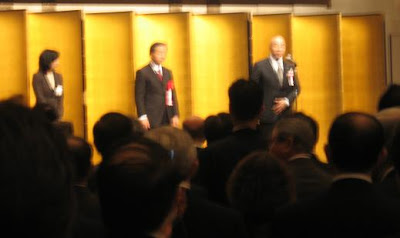
On March 31, 2008 the Liberal Democratic Party will die.
Well, perhaps not
the Liberal Democractic Party. But definitely
a Liberal Democratic Party...the great, voracious beak of the octopus--the clownish, spiritually debilitating hogfest that has been the party's heart since a mawkish small-time construction company owner named Tanaka Kakuei bobbed, weaved, pocketed and disbursed his way around all the pre-war elites and grand poobahs to a place at the head of the table--the wealth-destroying bachannalia of concrete and cash so crass and transparent in its corruption that it made Abe Shinzō and the fantabulists look good by comparison.
To not appreciate the primacy of road building in the country is to not understand the country at all. The archipelago is draped in dense network of roads... a network not just of the roads themselves (and the bridges, the tunnels, the landslide-prevention measures) but of contractors, sub-contractors, subcontractors' subcontractors, former bureaucrats, part-time farmers, the postal savings system, the Ministry of Land and Infrastructure and thousands of politicians who have nothing else to do but live off the system -- that
are The System.
When
Inose Naoki wrote his
Nihonkoku no Kenkyū (日本国の研究 -
The Study of the Country Japan) he did not start with a description of the Iron Triangle of bureaucrats, industrialists and politicians. He did not talk about the lifelong employment system, about
kaizen or about the prevalence of rote memorization in the schools. He did not talk about the
kami, self-sacrifice, dependent behavior or the ideology of the Meiji.
He wrote about infuriating excellence of Japan's logging roads--roads without traffic, going nowhere, scarring the countryside--
by design.
Over the last thirty-five years, nothing has been more important to a rural politician than the ability to dole out road construction contracts--indeed, for many politicians, securing of road construction contracts and getting reelected are the
yin and the
yang of government. One exists for the other--and for nothing else.
[Attending local social functions, the other mandatory activity of the rural politician, exists to prove to constituents that said politician is indeed still alive...which is not a joke,
as we learned last year.]
The gasoline tax is the blood of the Tanakaist polity. So sure have politicians been of its power to motivate the base that they never even bothered to remove the
zantei (interim, temporary) label from the levy. They knew, simply knew it would always be there--they indeed could not imagine political life without it.
When Koizumi Jun'ichirō set about saving the LDP by destroying it, he did so by siccing his two disrespectful, presumptuous attack dogs upon the road construction gang. His left hand loosed Inose upon the
Dōro Kōdan (Japan Public Highway Corporation), forcing its breakup and the cleaning up of its finances. His right loosed
Takenaka Heizō upon the Post Office, the piggy bank of the road construction state, forcing its breakup and privatization.
Since Koizumi's stepping down from the prime ministership, the road construction gang has been trying reassemble itself and get its hands back on the steering wheel. It got a huge boost of adrenaline in July of 2007 when Abe Shinzō's revisionist vision failed to entice the public into voting for the LDP. The stunning loss to Democratic Party leader Ozawa Ichirō's hoary and utterly insincere promises of transfers of wealth from the city to the countryside revived the hopes of the road construction partisans.
[Just an aside--does anyone else think that Tokyo Governor Ishihara Shintarō's
promise to send 300 billion yen of Tokyo tax money to the hinterlands might have more to do with buying rural LDP member support for his son Nobuteru's run at the LDP party presidency than buying central government support for Ishihara Senior's quixotic bid to have Tokyo host the 2016 Olympics?]
Humpty Dumpty, however, is finding it hard to get back together again. Despite the full-court press of the traditional
sanyaku (Koga Makoto is strangely absent from the debate) the LDP's road tribe could not get its act together in time to push the gasoline tax extension bill through the Diet. The party executive and local assemblymen staged a high-profile emergency meeting on January 23 to scare the Diet into voting for the extension...then, when that failed to have the expected effect, staged
another emergency meeting on February 8, this time dragging in the prefectural governors, including the always-good-for-a-made-for-television-event Higashikokubaru Hideo of Miyazaki Prefecture.
To no avail.
The Tanaka Democracy has had an incredible run, staying a viable pantomime of electoral democracy well past the point where it descended into farce (when the both the population and the number of full-sized cars on the road are shrinking, how is it possible to argue that the country needs more and better roads?) The recent explosion in the number of talk shops, the new transparty alliances, the nervous runs for membership in the factions (I do not share all of Okumura Jun's faith in
the resurgent significance of the factions. Frankly, I believe LDP politicians are joining factions for the same reason some people surf the Internet: it sure beats working), the hopped-up patriotism of the revisionists--all point to a deteriorating certainty in the ability of politicians to simply buy off the party's base.
It turns out the money is not there--Tanakaism has done to the peace-loving, low-tax Japanese state's finances what the military-media-industrial complex, outrageous defense expenditures and unending warfare have done to the finances of the United States. The gasoline tax, if it is saved, will be shoveled into the general fund, where it will be used to fill other holes than those found in road top surfaces. In the nebulous vastness of the general fund's flows--or, horror, of horrors, in a carbon-abatement levy--the link between one's local LDP politician and one's bank account will no longer be not crystal clear.
At which point, the LDP--Tanaka Kakuei's LDP--will be dead.
 Prime Minister Fukuda Yasuo struggles to stay awake
Prime Minister Fukuda Yasuo struggles to stay awake














